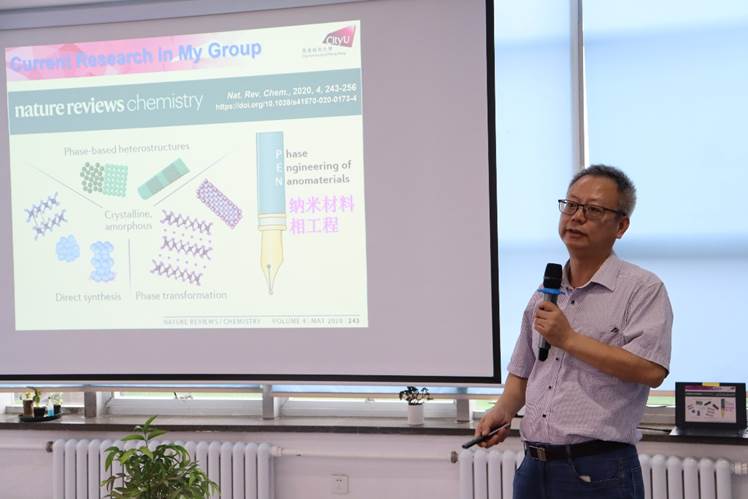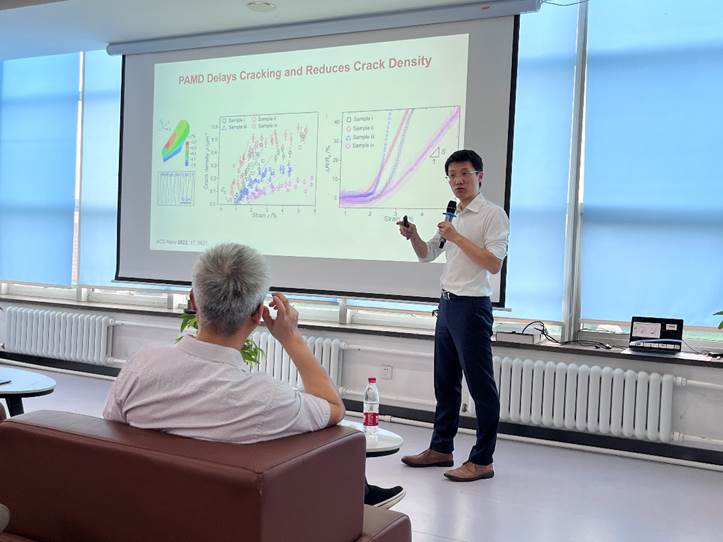On August 12-13, 2023, at the invitation of Prof. Tie Wang from the Life and Health Intelligent research Institute, Prof. Hua Zhang and Prof. Xiongwen Lou from the City University of Hong Kong and Prof. Zijian Zheng from the Hong Kong Polytechnic University were invited to give lectures on the topics of "Phase Engineering of Nanomaterials (PEN)", "Nanostructured Materials for Electrochemical Energy Storage and Conversion",“Soft and Permeable Electronics Materials, Device, and Energy”, Prof. Tie Wang, Vice President of Tianjin University of Technology and Dean of the Life and Health Intelligent Research Institute, chaired the presentation.


In the report, Prof. Hua Zhang shared the research work of his group in phase engineering of nanomaterials, especially the design and synthesis of novel nanomaterials with unconventional phases and their application studies, as well as the physicochemical properties of crystalline phase-dependent materials and their applications in catalysis and optoelectronic devices.Prof. Hua Zhang had an in-depth discussion with teachers and students on the design and synthesis of new nanomaterials, and put forward a prospect for the development of crystalline phase engineering of nanomaterials.

Prof. Zijian Zheng introduced the research work of the group mainly focusing on flexible wearable electronics and technology.Prof. Zijian Zheng introduced the background of wearable electronics, the challenges faced and the preparation of wearable metal fabrics, and stated that the goal of the related field is to develop wearable, skin-contactable, implantable and biologically safe materials and related flexible electronic devices.In addition, Prof. Zheng also demonstrated the ultra-high performance flexible electronic devices developed by them in the form of video for the students and teachers.

Prof. Xiongwen Lou detailed some of the group's work on the design, synthesis and electrochemical properties of nanostructured materials.For example, different hollow nanostructures of various metal oxides were synthesized for use as anode materials in lithium-ion batteries; functional hollow structures were designed for lithium-sulfur batteries, sodium-ion batteries, and lithium-metal anodes as well as a number of nanostructured electrocatalysts and single-atom catalysts were synthesized for use in different electrocatalytic reactions such as the oxygen reduction reaction (ORR), the oxygen evolution reaction (OER), the hydrogen evolution reaction (HER), and the CO2 reduction reaction.
Finally, Prof. Tie Wang summarized the reports of the three experts and hoped that all the teachers and students could learn their scientific research thinking and at the same time, find their own interested directions to dig deeper and explore to achieve their scientific research goals.At the same time, as researchers in science and engineering disciplines, they should be guided by a single factor in their scientific research, which should be the centerpiece and exclude the rest of the additional factors.
After the presentation, the teachers and students on the spot expressed that they had benefited greatly from the in-depth and humorous explanations of the three professors, which not only enriched our scientific knowledge, but also further clarified our work ideas and scientific research direction, which helped to inspire the output of more high-quality and influential scientific research results.